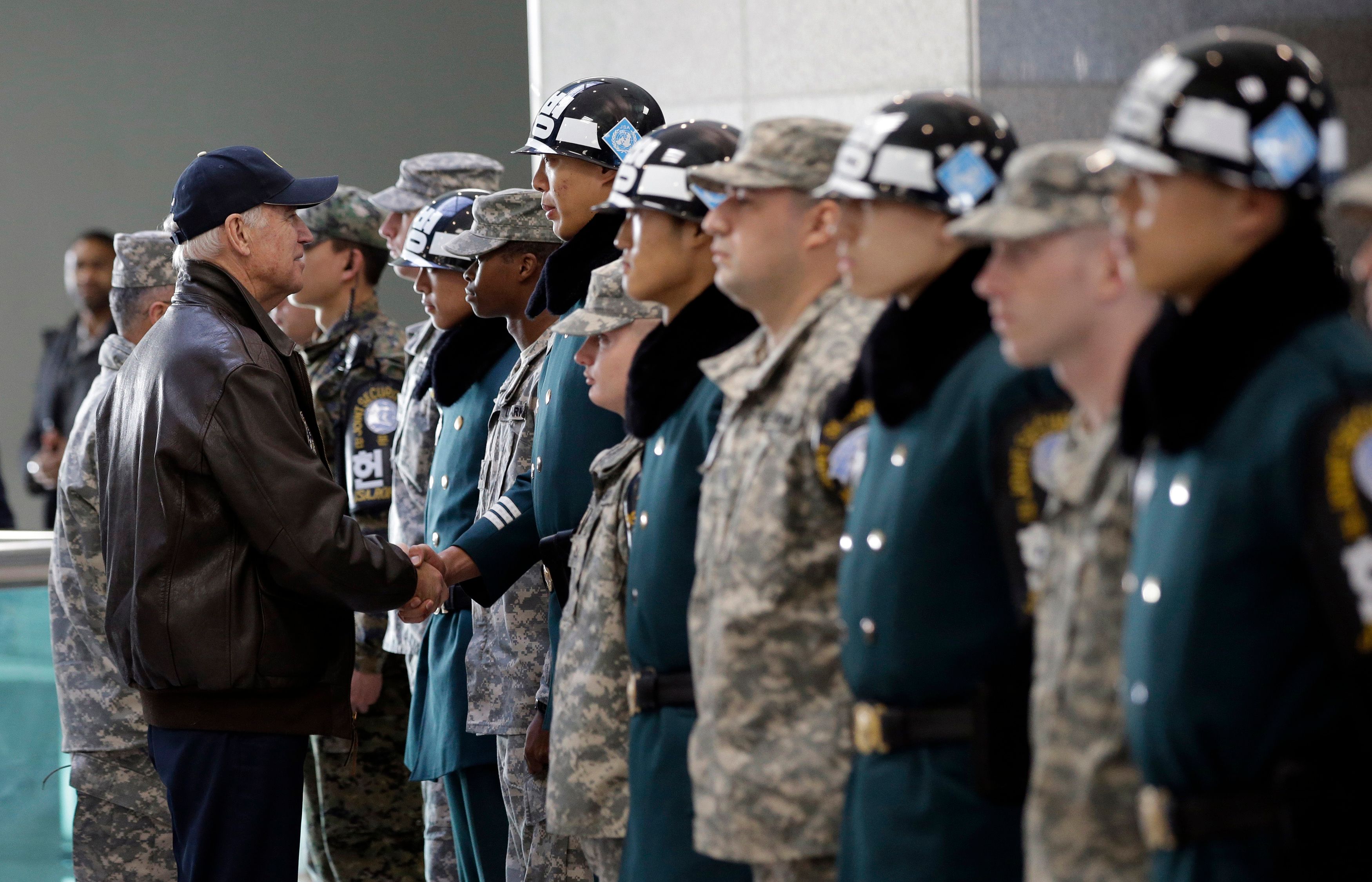Prospects for the U.S.-South Korea Alliance during the Biden Administration

During President Donald Trump’s time in office, the tensions in U.S.-South Korea alliance increased significantly. Negotiating an agreement on covering the costs of stationing U.S. troops in South Korea (Special Measures Agreement, SMA) remains a problem. The Trump administration’s excessive demands for payment, coupled with threats to withdraw troops, undermined the U.S. credibility as the guarantor of South Korea’s security. In recent years, the differences in the allies’ approach to the dialogue with North Korea also widened. Although the initiation of the talks between the U.S. and North Korea seemed beneficial to President Moon Jae-in, their course, especially the U.S. reluctance to ease sanctions and maintaining unrealistic demands for denuclearisation, undermined South Korea’s efforts to stabilise the situation on the peninsula. Moreover, given the intensifying rivalry between the U.S. and China, the Americans were more strongly urging South Korea to join the anti-China coalition, which from the Korean perspective means participation in the Quad initiative (the U.S., Japan, Australia and India), something it does not want.
The Biden administration will inherit Trump’s policy legacy and the current challenges, leaving the U.S.-South Korea alliance with three important issues to face: alliance management, coordinating policies towards North Korea, and the state of the relations in the context of the U.S.-China rivalry.
Management of the Alliance
The need to rebuild American alliances in the world, declared by Biden and his team, is perceived by South Korea as a forecast of stronger bilateral relations. As the U.S. president-elect has criticized Trump’s demands for payment and threats to withdraw troops from South Korea, swift agreement on defence cost-sharing is possible. The Biden administration will likely agree to South Korea’s recent proposal to increase its spending by 13% over the $920 million it paid in 2019, instead of the 50% increase demanded by the Trump administration.
It will be much more difficult to reach an agreement on transferring wartime operational control authority (OPCON) to South Korea from the United States Forces Korea (currently, if war broke out, the South Korean military would be commanded by a U.S. general). South Korea sees takeover of OPCON by its armed forces from the U.S. as a means of increasing autonomy in military affairs, thus strengthening the country’s position in the alliance and the international arena. Moon hopes that the OPCON transfer will be completed by the end of his term in May 2022. However, during a meeting of the U.S. defense secretary and South Korean defence minister in October, discrepancies over the conditions for OPCON transfer emerged. From the U.S. perspective, South Korea still does not meet the military requirements for the transition (it has only reached the first of the three necessary levels of operational capacity). In addition, verification of its defence readiness was made harder by Trump’s decision to cancel some joint military exercises and the limited drills during the COVID-19 pandemic.
Policy towards North Korea
The Biden administration intends to increase coordination of allies’ actions towards the North. Instead of summit diplomacy, preferred by Trump, Biden supports traditional “bottom-up” diplomacy, based on meetings of working-level diplomats and experts. This creates an opportunity for a regular exchange of views between American and South Korean diplomats, which could increase the South’s influence on U.S. policy towards the North. The South will urge the U.S. to move away from maximalist demands on denuclearisation pushed by the U.S. during the North Korean and U.S. leaders’ summit in Hanoi in 2019. The South will emphasise the need for a limited nuclear agreement with the North. It would include, for example, a verifiable dismantling of facilities at the Yongbyon nuclear complex, the adoption of a declaration of the end of the Korean War as a confidence-building measure, and a partial easing of sanctions imposed on North Korea in order to resume inter-Korean economic cooperation.
However, coordinating the positions of the U.S. and South Korea may be difficult due to different priorities. While for the Moon administration it is crucial to stabilise the situation on the Korean Peninsula through the development of the inter-Korean dialogue, for the U.S. denuclearisation is the most important objective. Moreover, South Korea fears that the Biden administration will initially put pressure on the North by strengthening sanctions policy (an attitude encouraged by his candidate for secretary of state, Tony Blinken), hoping to force it to make concessions and return to talks. A continued impasse in the U.S.-North Korea dialogue would weaken Moon’s inter-Korean policy.
U.S. Rivalry with China
A key factor affecting the U.S.-South Korean alliance is the context of relations between the U.S. and China. Despite bipartisan agreement in the U.S. on treating China as the main rival, Biden seems open to cooperation with China in multilateral forums on global issues, such as climate change or COVID-19. A greater attachment of the U.S. to cooperation within international organisations would serve South Korea, which for years has been treating multilateral engagement as one of the essential elements of its foreign policy.
However, the new U.S. administration will continue efforts to include South Korea in projects aimed at countering and containing China’s influence. While South Korea shares some of the U.S. concerns about China, it is not interested in joining anti-China coalitions, such as the Quad. This is mainly due to the strong economic ties with China, which is the South’s largest trading partner. In 2019, China accounted for 25% of South Korea’s exports and 21% of its imports. By comparison, the U.S. is the second most important partner, accounting for 13% of exports and 12% of imports. In this context, the experience of Chinese economic pressure on South Korea after the deployment of the American THAAD anti-missile system in 2017 is important. In addition, the South Korean authorities fear that antagonising China will result in deepening Sino-North Korean cooperation, which will further complicate the inter-Korean dialogue.
Another challenge for the U.S. policy towards China is the difficulties in trilateral cooperation between the U.S., Japan, and South Korea. Although Biden’s team emphasises the need to strengthen cooperation in this format, the ongoing crisis regarding historical and trade disputes between Japan and South Korea can complicate it. Therefore, the new U.S. authorities may more actively play a mediating role in this dispute.
Conclusions
Biden’s presidency gives hope for improvement of the alliance relationship between the U.S. and South Korea. Agreement on the SMA will contribute to stabilising the alliance and strengthening its military and political pillars. This will serve to narrow the gap between the U.S. and South Korea on OPCON transfer, although due to technical difficulties, such as the inability to carry out full-scale joint drills, wartime operational control is unlikely to be transferred until after Moon’s term of office.
Despite different priorities between the U.S. and South Korea towards North Korea, the allies will likely coordinate their activities in this field more than during Trump’s time. South Korea will seek to break the stalemate in North Korea-U.S. negotiations that has been ongoing since the summit in Hanoi in 2019. To do that, it will try to mediate contacts, for example via intelligence channels, between the new U.S. administration and the North Korean authorities. However, it will be decisive to involve the Biden administration itself in relations with the North. If the U.S. government remains passive in the first months of office due to a focus on combating the socio-economic effects of COVID-19, North Korea may try to persuade the U.S. to talks through provocations, for example, a submarine-launched ballistic missile test or sparking incidents on the border with South Korea.
The Biden administration’s policy towards South Korea may signal a more conciliatory approach by the U.S. to other allies, including those in Europe. That will make it easier to solve problems that arose during Trump’s term, for example, the tense negotiations over defence burden-sharing, including the costs of stationing American troops. It will also serve the U.S. efforts to obtain the support of its allies in its rivalry with China.


